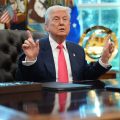Global markets experienced a wave of cautious optimism on Monday as renewed momentum emerged towards ending the protracted war in Ukraine. European leaders are en route to Washington for crucial discussions with U.S. President Donald Trump, following Trump’s meeting with Russian President Vladimir Putin in Alaska. While Asian markets reacted positively to the news, a sense of apprehension permeates the air. The hope for a swift resolution is tempered by expert warnings that a lasting peace agreement is far from guaranteed and could take years to achieve.
The ongoing conflict, which began in 2022, has severely impacted the global economy. Disrupted trade routes, strained supply chains, and deep geopolitical divisions between Western and Eastern powers are just some of the consequences. Traders are naturally eager for an end to the instability, hoping that the recent diplomatic activity signals a turning point.
However, analysts are quick to pour cold water on overly optimistic predictions. James Bindenagel, a visiting fellow at the German Marshall Fund and former U.S. ambassador to Germany, points out that peace agreements are inherently complex and time-consuming. He highlights Putin’s potential strategy of using peace talks as a smokescreen to prolong the conflict, a scenario that is unacceptable to many. This underscores the need for a realistic approach, one that acknowledges the potential for a lengthy negotiation process.
The upcoming summit in Washington will involve key European leaders alongside Ukrainian President Volodymyr Zelenskyy. Discussions will focus on Ukraine’s future and the conditions for a potential peace deal, including contentious issues such as land swaps and security guarantees. President Trump’s previous statements, including his rejection of Ukraine regaining Crimea and joining NATO, add another layer of complexity to the negotiations.
Zelenskyy is likely to face significant pressure to compromise. In a Truth Social post, Trump suggested Zelenskyy could end the war swiftly if he chose to, or continue fighting. This sentiment, while potentially intended to pressure Zelenskyy, highlights the immense pressure facing the Ukrainian leader to reach an agreement. This echoes similar sentiments expressed by Oleksiy Goncharenko, a Ukrainian lawmaker, who emphasizes the difficulties and time required for a comprehensive peace deal.
Meanwhile, European defense stocks have seen a boost, reflecting the ongoing commitment to increased defense spending regardless of the negotiation outcomes. Companies such as Rheinmetall, Hensoldt, Renk, Leonardo, BAE Systems, and Babcock experienced notable gains. This highlights the market’s recognition of the continued need for strong defense capabilities, even in the event of a peace agreement.
Olivia Allison, a senior advisor at PRISM Strategic Intelligence, reinforces the expectation of a protracted negotiation process, advising against any hopes for a rapid resolution. She emphasizes that even a peace deal would not signify an immediate end to strained relations between Russia and Europe, underscoring the long-term implications of the conflict. The path ahead remains uncertain, with a lengthy and challenging negotiation process expected, regardless of the initial optimism surrounding recent diplomatic efforts.










